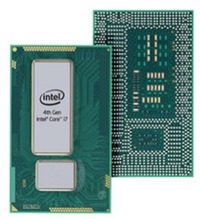Intel's Computex honeymoon unlikely to last, says analyst

As the barrage of processor news from Intel this week at Computex fades, the reality of a commoditized semiconductor market will again start to hit home.

Piper Jaffray analyst Auguste Gus Richard, who has been critical of Intel's business model and mobile prospects, cut his estimates, rating, and price target on the company's shares. The big problem: The PC market forecast as well as ARM, which will at the very least ensure Intel makes little money on the mobile front. Intel's Haswell and Silvermont platforms are promising, but only go so far. Richard said:
We are lowering our PC forecast (down 6.9 percent in 2013 from down 2.9 percent) and believe current demand is channel fill. Tablets and smartphones, other components and capabilities (displays, cameras, apps etc.) are taking attention and dollars away from the CPU. Additionally, an army of ARM-based suppliers have come to market commoditizing the processor market. Leading smartphone and tablet vendors are also using internally-designed ARM-based CPUs and now low-end CPUs are available for as little as $4.
The week in Computex:
PC industry pushes 2-in-1 hybrid devices: You buying? | Inside Samsung's Galaxy Tab 3, an Intel chip | Could price be Haswell's Achilles' heel? | Intel bets on better battery life as the killer next-gen Core feature | ARM: A 'generation ahead' of Intel? | Intel's Haswell launch may take backseat to Atom vs. ARM | Computex 2013: Intel makes case for Atom in tablets and smartphones | Computex 2013: Intel announces Haswell for 2-in-1 devices, fanless Core-powered convertibles | Intel aims to reboot PC market with Haswell, ultrabooks and two-in-one devices
Richard noted Intel's Silvermont platform, a new Atom architecture aimed at ARM, will hurt Haswell more than it does ARM. Overall, Intel will see lower profit margins. Richard noted:
Haswell will no doubt improve battery life and Windows Blue or 8.1 will be an improvement over Windows 8. We don't think it is enough though. These efforts are likely to be too late in the year to drive real growth in PCs in CY13 or 1H:14. We expect to continue to see tablets taking shares from notebooks with the desktop market remaining stagnate. While Intel will gain a toehold in the tablet market with Silvermont, it is likely at the expense of notebook sales.
Not all analysts are down on Intel, but it's clear that the debate on the chip giant's prospects are going to resume again post-Computex. Richard Whittington, an analyst at Drexel Hamilton, said it's clear that Intel is in better mobile shape than a lot of people thought. Intel's Atom will power Samsung's Galaxy Tab 10.1 and that's a big win.
Intel's "mobile success is far from certain, but the company's next-gen Atom chips can get a phone and tablet foothold if Samsung cannot make 20 nanometer mobile ARM chips," said Whittington.